The Island of Sea Women Read online
Page 18
“It is not a diving period now. Perhaps you should take a day to visit your friend in the city,” Jun-bu suggested. “The air might be better for you and Min-lee.”
It was a perfect idea, but I didn’t want to leave Jun-bu alone. Still, he insisted. For days, I scavenged for gifts to bring: mushrooms picked on the side of an oreum, mugwort gathered shoreside in case Mi-ja needed to clean glass, and seaweed so she might flavor her husband’s soup. All these things I packed into a basket. Jun-bu gave Mi-ja’s address to the cart driver, and I was off to see my friend.
When Min-lee and I arrived in Jeju City . . . Hyng! The streets were barely passable. Thousands of Japanese soldiers—as well as Japanese businessmen, merchants, and their families—filed in long lines toward the harbor to board ships; coming the other direction were thousands upon thousands of Jeju people returning home from Osaka and other places in Japan, where they’d done migrant work. Unemployed men and women milled everywhere, because the Japanese-owned factories and canneries had closed. And then there were the refugees, who’d fled south and to our island after the country had been divided at the Thirty-eighth Parallel. The past few weeks had been frightening, but the crowds and chaos deeply unsettled me.
I was still troubled when the driver pulled the cart to a stop in front of a Japanese-style house. I knocked, and Mi-ja greeted me at the door, her baby on her shoulder, his neck wobbling as he lifted his head to look at me. She hadn’t known I was coming, but she didn’t seem excited by my unexpected appearance at her home. I wrote her reaction off as surprise. When she wordlessly glided deeper into the house, I slipped off my shoes and followed her. The house was even bigger and more elegant than I’d imagined. Everything was clean and tidy. A vase of flowers stood on a windowsill. The floors were polished teak instead of the worn planks I’d grown up with. The cushions we sat on were made of silk. The room was eerily quiet even with two babies not yet four months old. We laid them side by side. Mi-ja’s son sucked on his fist. My daughter slept. Mi-ja and I would have to wait a long time before we’d see them play together, let alone negotiate a marriage match. Children are hope and joy. A sense of peace, of everything being right—something I’d never felt, as nice as they were, with Gu-sun and Wan-soon back in Hado—sank into my bones, but when I took in Mi-ja, my perceptions forcibly shifted. She looked as pale and scared as when we’d said goodbye on the dock. I asked the first question that entered my mind.
“Where is everyone?”
Her eyebrows rose on her forehead like two caterpillars. “You would think that collaborators like my father-in-law would have been punished. Instead he’s been hired by”—and here she struggled with the words which were new to all of us—“the transitional American government to help the U.S. Army with logistics.”
The words and concepts were foreign to me, but it was the way she spoke them that was unnerving. She whispered, even though we were alone.
“The Americans want the island to be kept running as smoothly as possible,” she went on, almost as if she’d memorized what she felt she had to say. “They plan to restore the businesses and enterprises that shut down when the Japanese left. And are still leaving . . . My father-in-law says there could be riots with so many of our citizens out of work. He says more than one hundred thousand migrants have returned home from Japan.” Those would be some of the people I’d seen loitering on the streets coming here. “Men—and women—will do desperate things when they’re hungry.”
“We’ve always been hungry on Jeju,” I allowed.
“This is different. Too many people and not enough food.” She sighed. “My father-in-law was a collaborator for the Japanese. Now he’s a collaborator for the Americans. I will always have that label associated with me.”
Was that true? Was she unable to shift her fate? No matter how many offerings we make to goddesses, it’s nearly impossible to change our destinies. I tried to steer the conversation in a new direction.
“My mother-in-law is not a bad woman,” I said. “I have great respect for her water skills, but I’m happy not to be living in her compound. How are things with your mother-in-law?”
All brides talk about these issues, and I expected Mi-ja to share her heart with me as she always had.
“Madame Lee went to the five-day market,” Mi-ja answered, and that was that. Her eyes drifted to the window. I had the sense she was longing for the sea, but how odd that she wasn’t inquiring after me, my husband, or the people we knew. And not a single question about Hado.
I tried a different approach. “Is your husband well?”
Her body had such lightness to it. She could have lifted right off the floor and out the window. “The last time Sang-mun wrote to his parents was five months ago,” she answered. “He was in Pyongyang, above the Thirty-eighth Parallel, visiting warehouses and learning to better manage shipments and storage. We’ve not heard from him again.”
Maybe this wasn’t the worst news. Still, I hesitated before responding. I placed a hand on her knee and tried to sound positive. “You must not worry. One Korean would never hurt another Korean.”
But as the afternoon wore on, I understood there was no point in trying to comfort my friend. She was paralyzingly unhappy. She needed to leave this place.
“You could go back to Hado,” I suggested.
“And live with Aunt Lee-ok and Uncle Him-chan? Never.”
“You could come to Bukchon and rent rooms near me—”
“I couldn’t live in a village as though I were a widow. I would be nothing.”
“Not as a widow,” I answered, hurt. “As my friend.”
All in all, it was a disheartening visit.
Before I left, Mi-ja gave me money to hire Shaman Kim the next time I went to Hado, so she could perform a ritual to retrieve Sang-mun’s lost and wandering soul. I returned to Bukchon feeling grateful for my husband, our home, and the stability of my life, which—while completely different from anything I’d previously known—was secure, peaceful, and happy. I worked as a haenyeo, and Jun-bu taught his classes unfettered by Japanese occupiers. He spoke to his students entirely in our native tongue, and they used their Korean names and spoke in the Jeju dialect without fear of punishment. We could do these things, because we were free from the colonists at last, although we still didn’t know what life with the American occupiers would be like.
When Jun-bu and I took the family to Hado for a visit, I sought out Shaman Kim, who conducted the ceremony for Sang-mun. “Where is the husband of Mi-ja?” she asked the gods. “Bring him home to his wife. Bring him home so he might show respect to his parents. Bring him home so he might meet his son.”
* * *
In June, a baby boy easily slipped out of me. We named him Sung-soo, with the soo as his generational name, which all sons born to Jun-bu and me would share. I dressed Sung-soo in the special outfit for him to wear during his first three days of life from good-luck material given to me by Gi-won. Bukchon’s shaman blessed him. Her powerful spirit infused his spirit. He not only survived his first three days but turned out to be a strong baby with big lungs and a lusty appetite for my milk.
When he was four months old and fall colors blazed on Grandmother Seolmundae’s flanks, Jun-bu, Yu-ri, Min-lee, and I took a boat to Hado to help my father perform ancestor worship for my mother, my sister, my fourth brother, and my two brothers who had not returned home after the war ended. As soon as we arrived and were settled in my natal home, Jun-bu fetched his mother. Do-saeng beamed with joy when she entered my father’s house. “A grandson!” she shouted. But beyond the guarantee that ancestral rites would be performed for her for another generation, she was happy to see her daughter, although Yu-ri didn’t seem to remember who she was. Together, Do-saeng and I worked side by side to prepare the ritual foods. This year our ingredients were minimal, but we were able to make soup with tilefish, white radish, and seaweed, a bowl of seasoned bracken, and turnip and green onion buckwheat pancakes, since ancestors are known to have a fondn
ess for these dishes.
My father was chasing Min-lee, who was fifteen months old and a master walker, when we heard a honking horn. I knew only one family who owned an automobile. I dried my hands and ran through the olles to the main road. Indeed, there was Sang-mun’s family car. Mi-ja stood by the open back door, leaning in. She straightened, pulling out Yo-chan. She set his feet on the ground. She wore a Western-style dress and a hat decorated with a long pheasant feather. Yo-chan, whose plump cheeks made him into a miniature image of his father, had grown a lot this past year.
“Have I ever missed marking this day with you?” my friend asked. “Sun-sil was like a mother to me.”
Just then, the sedan’s other door slowly swung open, and Sang-mun emerged. I hadn’t seen him in two years, and I might not have recognized him if he had not been with Mi-ja and her son. He’d turned to skin and bones. His eyes and cheeks were sunken. He also wore Western-style clothes, but on his feet were the straw sandals Mi-ja had made as a traditional wedding gift. His feet were covered with open sores.
“My husband escaped from the north,” Mi-ja explained, speaking for the broken man beside her. “When he first came home, we thought he might not live. Now we are here to ask Shaman Kim to thank the gods and spirits who worked on his behalf. I think he can heal here.”
We ended up staying together in Hado for a week. Jun-bu made bowls of sea urchin porridge—known to help the elderly and ailing babies—which Sang-mun slurped down. Each morning, my husband helped Sang-mun to the shore, so he could soak his feet in salt water. The two men watched our children, while Mi-ja and I went diving with Do-saeng’s collective. In the early evenings, the four of us sat on the rocks, watching the sun set, drinking rice wine, and doting over our children, who’d stand, fall, grab on to a rock, pull themselves up again, totter over the uneven surface, and fall again.
One day Sang-mun took photos of Mi-ja and me with his wedding camera as we stepped out of the sea in our diving clothes. I took that as a sign he was feeling better, except that his mind remained both bitter and terrified. Like many of those who’d escaped from the north, he hated communism and was distrustful of the direction Jeju and the rest of the country might take, while my husband was idealistic about our new nation and what it could become. By the time we all needed to return to our own homes, the two husbands were barely speaking.
Day 3: 2008
Young-sook has another fitful night. She lies on her sleeping mat, staring at the ceiling, and listening to the sound of waves hitting the rocks. She punishes herself for the bad judgment she showed during her dive yesterday and if it’s a hint that worse might be coming. She frets about her children, grandchildren, and great-grandchildren. She agonizes over what will happen if Kim Il-sung decides to invade South Korea again. She worries about Roh Tae-woo, a former general and now the first president to be elected by the South Korean people, even if he was handpicked by his predecessor. She wonders if maybe it’s better to have the corrupt leader you know . . . But Roh is going to host the Olympics in Seoul . . . She keeps hearing about “the world stage,” but what if . . . If eighty-five years have taught her anything, it’s that governments come and go and that whoever and whatever comes next will eventually become rotten.
These things clutter the front of her mind, and she’s grateful in some way, because deeper, more persistent memories of screaming and begging keep floating into view. She counts forward and backward. She scrubs an imaginary eraser against the inside of her skull. She relaxes each toe, then her arches, then her ankles, then her calves, slowly working her way up to her forehead, and back down again. She does everything she can to push the bad pictures out of her head. None of it works. It never does.
When dawn finally comes, Young-sook gets dressed, eats breakfast, and considers what will come next. Some of her friends find company in television soap operas, but the troubles of the characters are of no interest to her. No, she is not the kind of old woman to sit inside and watch television. However, today—and she hates to admit it—she feels worn out. How pleasant it would be to go down to the shore and rest in the pavilion. There, she could look out to the sea, watch the haenyeo bobbing up and down not far offshore, and listen to the lilting, haunting cries of their sumbisori. Or she could doze. No one would bother her, because she’s an ancient who’s earned the respect of everyone in Hado.
Instead, habit takes her to the cement building with the tin roof that is now Hado’s bulteok. Women sit outside on their haunches. They wear long-sleeved shirts with floral or checkerboard prints. Their faces are protected from the sun by big straw hats or broad-brimmed bonnets. Their feet, covered in droopy white socks, are tucked into plastic slippers or clogs. The man in charge of the cooperative talks to them through a bullhorn. She can’t decide what she dislikes more—that they’re being ordered around by a man or the whining sounds of his bullhorn. “Today you will do a job as old as haenyeo tradition—but with a new title—working as guardians of the sea.” It used to be said that the sea’s gifts were like a mother’s love, unending, but parts of the sea are turning white, where coral, algae, seaweed, and sea creatures have perished. Some of this has been caused by the change in climate, some by overfishing, and some by human disregard. Therefore, the haenyeo will dive for a harvest of Styrofoam, cigarette filters, candy wrappers, and bits of plastic. The man from the cooperative ends his orders with “Young-sook and the Kang sisters will gather litter on the shore today.” He’s trying to let her save face for the mistake that almost led to her death yesterday, but she wonders how long it will be before she’s allowed to dive again, even in the shallows.
The younger women—noticeably fewer than even ten years ago—grab their gear and climb on the back of the truck to be taken to the boat. The Kangs and Young-sook gather their nets and cushions, then begin hobbling down to the beach. The sisters start in right away.
“Hey, old woman, thank you for this special treat!” Kang Gu-ja gripes.
“We love sitting in the hot sun!” Kang Gu-sun chimes in.
Young-sook should bite back at their teasing, but she’s noticed that half-and-half girl, Clara, perched on a rock. She wears a tank top and shorts that barely cover her crotch. Her bra straps show. Once again, she’s wearing earbuds. Young-sook’s great-grandchildren bob their heads when they listen to their music. Not this girl. She has a somber look on her face.
Young-sook changes course and walks straight to the girl. She keeps her Jeju words simple. “You here again?”
“I could say the same to you,” Clara says with a smile as she pulls out an earbud and lets the wire drip down her chest.
“I live here!”
“I’m visiting. I couldn’t take another day of sightseeing. I just couldn’t. Mom and Dad let me take the bus out here.”
“By yourself?” Young-sook asks, but inside she’s relieved the whole family didn’t come.
“I’m fifteen. What were you doing when you were fifteen?”
The old woman juts her chin. She’s not going to answer that.
Except for the clothes, Clara has Mi-ja’s eyes, legs, and manner. Young-sook should look away or leave or something. Instead, she says what she thought the first time she saw the girl. “So you’re Mi-ja’s great-granddaughter.”
“Great-granddaughter, yes,” Clara answers. “We shared a room, and she only spoke the Jeju dialect to me. She could speak English. I mean, she had to, right, having the shop and all? But her English was superbad. And you know how old ladies are. Talk, talk, talk. I had to learn it if I was going to understand her.”
The girl’s been speaking in the past tense. That must mean Mi-ja is gone. Young-sook focuses her eyes on the shell of a dead sand crab, which helps her control her emotions. Clara stares at her, though, waiting for her to say something. Young-sook settles on “Where have you gone? These sights—”
Clara flips a few strands of hair over her shoulder. “We hiked around Mount Halla Park. We climbed the Seongsan Ilchulbong Oreum to watch the sunr
ise. We toured Manjanggul—‘the world’s largest lava-tube cave system in the world.’ ” She sighs.
“Lots of natural beauty,” Young-sook says, but she remembers when people weren’t allowed on Mount Halla, when an oreum was for sitting on when you talked with a friend, and when the caves were places of hiding and death. “Mount Halla. We call it Grandmother Seolmundae—”
“But that’s not all,” Clara rushes on. “We’ve visited lots of museums or things they call museums or shrines or something. We went to where Jeju’s three founding brothers climbed out of a hole in the ground. And guess what. It’s just a hole in the ground! We went to a stone park. It had a bunch of stones. Stones! Then we went to this place to celebrate the life of some woman, Kim Something, who saved the people of Jeju during a famine.”
“Kim Mandeok.”
“That’s the one. They treat her like a god too.”
“Goddess.”
“And what’s with all the Swiss stuff? You know, like the Swiss Village and all the Swiss restaurants and the Swiss houses and—”
“Do all American girls complain?” Young-sook asks.
Clara shrugs, remains silent for a moment. Then she recites the new marketing slogan that’s been plastered on the sides of buses and on billboards in English and Korean. “The World Comes to Jeju, and Jeju Goes to the World! What’s that all about?”
“Tourism? The future?”
“Well, that’s dumb. Because it’s not like the world is coming here. It wouldn’t be at the top of my list.” Clara wrinkles her nose. “If it’s about the future, that’s even more lame. I mean, like, Jeju people seem to live in the past and not in the present. And certainly not in the future.”
How can Young-sook explain what she feels about all that to a fifteen-year-old? The past is the present. The present is the future.

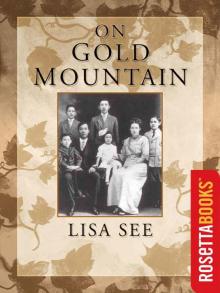 On Gold Mountain: The One-Hundred-Year Odyssey of My Chinese-American Family
On Gold Mountain: The One-Hundred-Year Odyssey of My Chinese-American Family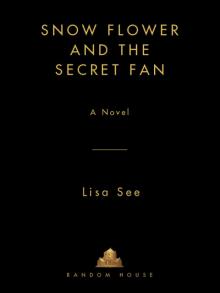 Snow Flower and the Secret Fan
Snow Flower and the Secret Fan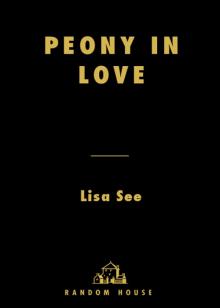 Peony in Love
Peony in Love Flower Net
Flower Net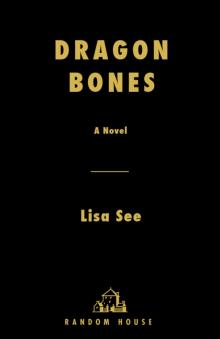 Dragon Bones
Dragon Bones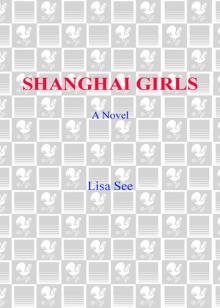 Shanghai Girls
Shanghai Girls Dreams of Joy
Dreams of Joy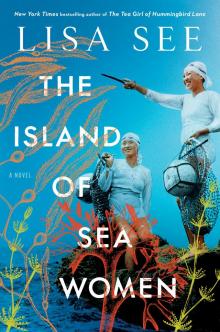 The Island of Sea Women
The Island of Sea Women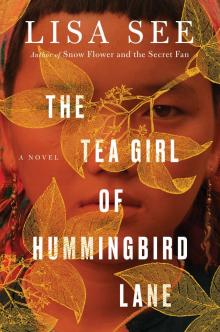 The Tea Girl of Hummingbird Lane
The Tea Girl of Hummingbird Lane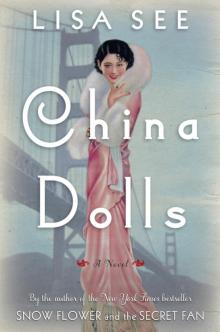 China Dolls
China Dolls The Interior
The Interior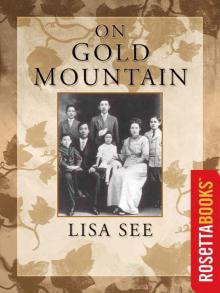 On Gold Mountain
On Gold Mountain